英语作文-如何用英语讲好中国故事复习课程
- 格式:doc
- 大小:14.00 KB
- 文档页数:3
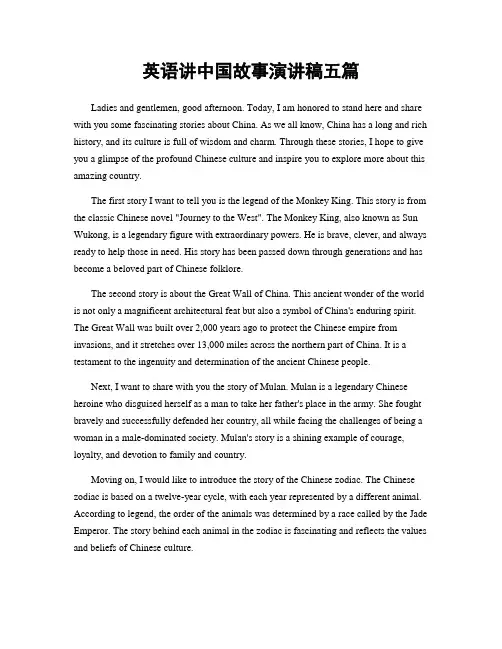
英语讲中国故事演讲稿五篇Ladies and gentlemen, good afternoon. Today, I am honored to stand here and share with you some fascinating stories about China. As we all know, China has a long and rich history, and its culture is full of wisdom and charm. Through these stories, I hope to give you a glimpse of the profound Chinese culture and inspire you to explore more about this amazing country.The first story I want to tell you is the legend of the Monkey King. This story is from the classic Chinese novel "Journey to the West". The Monkey King, also known as Sun Wukong, is a legendary figure with extraordinary powers. He is brave, clever, and always ready to help those in need. His story has been passed down through generations and has become a beloved part of Chinese folklore.The second story is about the Great Wall of China. This ancient wonder of the world is not only a magnificent architectural feat but also a symbol of China's enduring spirit. The Great Wall was built over 2,000 years ago to protect the Chinese empire from invasions, and it stretches over 13,000 miles across the northern part of China. It is a testament to the ingenuity and determination of the ancient Chinese people.Next, I want to share with you the story of Mulan. Mulan is a legendary Chinese heroine who disguised herself as a man to take her father's place in the army. She fought bravely and successfully defended her country, all while facing the challenges of being a woman in a male-dominated society. Mulan's story is a shining example of courage, loyalty, and devotion to family and country.Moving on, I would like to introduce the story of the Chinese zodiac. The Chinese zodiac is based on a twelve-year cycle, with each year represented by a different animal. According to legend, the order of the animals was determined by a race called by the Jade Emperor. The story behind each animal in the zodiac is fascinating and reflects the values and beliefs of Chinese culture.Lastly, I want to tell you about the legend of the Dragon Boat Festival. This traditional Chinese festival commemorates the patriotic poet Qu Yuan, who drowned himself in the Miluo River as a form of protest against the corrupt government. To prevent fish from eating his body, people threw rice dumplings into the river and rowed dragon boats to scare the fish away. This festival is celebrated with dragon boat races, eating zongzi (rice dumplings), and other customs to honor Qu Yuan's memory.In conclusion, these stories are just a small part of the vast and diverse Chinese culture. They represent the wisdom, bravery, and spirit of the Chinese people, and they continue to inspire and captivate audiences around the world. I hope that through these stories, you have gained a deeper appreciation for the beauty and richness of Chinese culture. Thank you for listening.。
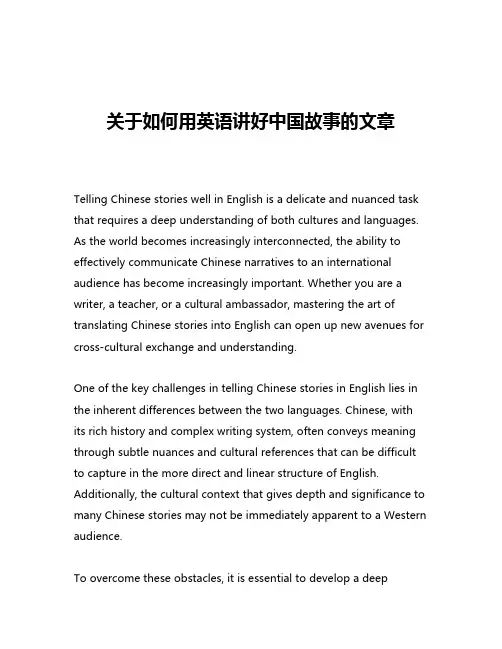
关于如何用英语讲好中国故事的文章Telling Chinese stories well in English is a delicate and nuanced task that requires a deep understanding of both cultures and languages. As the world becomes increasingly interconnected, the ability to effectively communicate Chinese narratives to an international audience has become increasingly important. Whether you are a writer, a teacher, or a cultural ambassador, mastering the art of translating Chinese stories into English can open up new avenues for cross-cultural exchange and understanding.One of the key challenges in telling Chinese stories in English lies in the inherent differences between the two languages. Chinese, with its rich history and complex writing system, often conveys meaning through subtle nuances and cultural references that can be difficult to capture in the more direct and linear structure of English. Additionally, the cultural context that gives depth and significance to many Chinese stories may not be immediately apparent to a Western audience.To overcome these obstacles, it is essential to develop a deepappreciation for the cultural and linguistic nuances of both languages. This means not only having a strong command of the English language but also a nuanced understanding of Chinese culture, history, and social dynamics. By immersing oneself in both worlds, storytellers can begin to identify the key elements that make a Chinese story compelling and find ways to translate them effectively for an English-speaking audience.One effective strategy is to focus on the universal themes and emotions that underlie many Chinese narratives. While the cultural context may be unique, the human experiences of love, loss, triumph, and struggle are often universal. By highlighting these shared experiences, storytellers can create a bridge between the Chinese and English-speaking worlds, allowing the audience to connect with the characters and their journeys on a deeper level.Another important aspect of telling Chinese stories well in English is the careful selection and translation of language. The richness of the Chinese language, with its multitude of idioms, metaphors, and poetic expressions, can be a double-edged sword when translated into English. It is crucial to find the right balance between preserving the original meaning and nuance while also ensuring that the language flows naturally and is accessible to the target audience.This may involve some creative adaptations, such as finding Englishequivalents for Chinese idioms or explaining cultural references in a way that resonates with the reader. The goal is not to simply translate word-for-word but to capture the essence and spirit of the original story in a way that feels authentic and engaging to the English-speaking audience.In addition to linguistic considerations, the structure and pacing of the narrative can also play a crucial role in effectively telling Chinese stories in English. Chinese storytelling often follows a more cyclical or episodic structure, with a greater emphasis on character development and the exploration of themes rather than a linear plot progression. Adapting this approach to the more linear and plot-driven expectations of Western audiences can require careful planning and execution.One way to achieve this balance is to identify the key narrative arcs and emotional beats that resonate universally, and then use those as the foundation for the storytelling. By weaving in the cultural context and nuances in a way that enhances the overall narrative, storytellers can create a rich and immersive experience for the reader or listener.Furthermore, the use of visual elements, such as illustrations, photographs, or even film, can be a powerful tool in enhancing the storytelling experience. By incorporating these visual aids, storytellers can help bridge the cultural gap and provide a moreholistic understanding of the Chinese context.Ultimately, the art of telling Chinese stories well in English requires a deep understanding of both cultures, a mastery of language, and a keen eye for narrative structure and pacing. It is a challenging but rewarding endeavor that has the potential to foster greater cross-cultural understanding and appreciation.As the world becomes increasingly interconnected, the need for effective cross-cultural communication has never been more pressing. By honing the skills to tell Chinese stories in a way that resonates with an English-speaking audience, storytellers can play a vital role in shaping a more inclusive and understanding global community.。

How to tell Chinese stories well in EnglishNow China, is rising in the Forest of nations in the world, so that the world's attention, but also more foreigners interested in the Chinese story. Now the Chinese people are more and more proud of their own country, but also very much want to spread their own language and culture to other places. Therefore, as a Chinese, it is very important to learn how to tell Chinese stories well in English. I have the following suggestions.First of all, to fully understand the Chinese culture. As one of the Cradle of civilization, China has a long history and splendid culture of 5,000 years, it is the generation of ancestors who linked their dreams to the motherland and forged the indomitable Chinese heart that sustains the continuous development and progress of this civilization. How can we tell foreigners our stories in detail if we don't know Chinese culture? Just know that Chinese culture is the root, is not easily shaken enough. To know more about China's fine traditional culture is the first step to tell a good Chinese story.Next, learn English well. Learning English well is a prerequisite to tell Chinese stories well in English, especially in Oral English. We should speak English accurately and fluently, and tell the story in accordance with the rules of grammar, so as to better tell Chinese stories in English.Last but not least, respect cultural differences and build bridges of communication. In the process of learning English, we should also have a deep understanding of the cultural background of the language, feel the ideas contained in the culture, know the differences between the two cultures, and then build a bridge of communicationbetween the two cultures, promote better communication between the two sides.In my opinion, to tell Chinese stories well in English is a glorious and arduous task, but I believe we can do it well!。
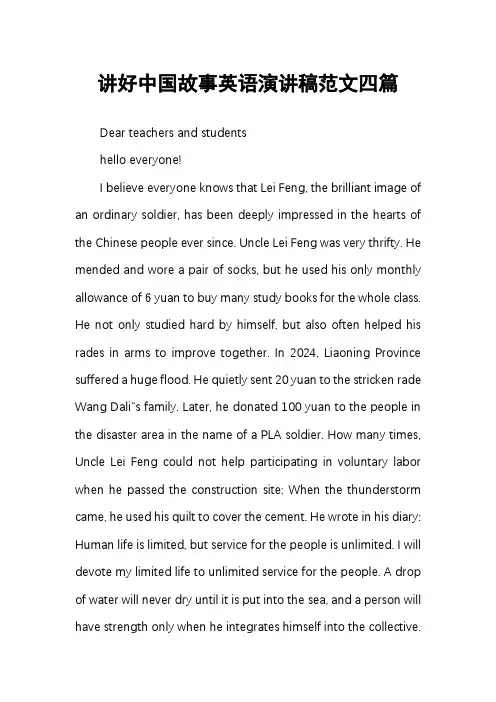
讲好中国故事英语演讲稿范文四篇Dear teachers and studentshello everyone!I believe everyone knows that Lei Feng, the brilliant image of an ordinary soldier, has been deeply impressed in the hearts of the Chinese people ever since. Uncle Lei Feng was very thrifty. He mended and wore a pair of socks, but he used his only monthly allowance of 6 yuan to buy many study books for the whole class. He not only studied hard by himself, but also often helped his rades in arms to improve together. In 2024, Liaoning Province suffered a huge flood. He quietly sent 20 yuan to the stricken rade Wang Dali"s family. Later, he donated 100 yuan to the people in the disaster area in the name of a PLA soldier. How many times, Uncle Lei Feng could not help participating in voluntary labor when he passed the construction site; When the thunderstorm came, he used his quilt to cover the cement. He wrote in his diary: Human life is limited, but service for the people is unlimited. I will devote my limited life to unlimited service for the people. A drop of water will never dry until it is put into the sea, and a person will have strength only when he integrates himself into the collective.Why can a wooden nail be nailed in? Because it has two advantages: one is squeezing force, the other is drilling force. We should also carry forward this "nail" spirit in our studies. Lei Feng can do this. As the successor of the new century, isn"t he just carrying forward this spirit? Lei Feng said: I live only for one purpose, that is, to be a useful person to the people.It is true that youth is beautiful, but the real youth belongs to those who always strive for the top, those who always forget their own work, and those who are always modest. Treat rades as warm as spring, treat work as hot as summer, treat individualism as if autumn wind swept Lei Feng. With an immortal name, you will always be an immortal lamp, and you will always live in our hearts! We want to learn from you and ask you to be our role model! You will always live in our hearts!Thank you!My China dream As we all know, everyone has a dream, every Chinese has a Chinese dream. I have a Chinese dream, too.I am a student in a middle school. My Chinese dream is to inherit on the generation of their dedication, make our motherland more powerful, more and more people rich. At the same time, let the next generation a better condition to realize their dream of china.Before we state the poor and weak, suffering from bullying, when every Chinese people want to own a powerful motherland, the motherland strong, can we live a happy life? Make our country strong, let the Chinese people stand up, this is our pursuit of the last generation Chinese dream! After a struggle, a generation of people"s dream has been fulfilled, have a look have a look around us, with a smile of you. As a generation of people dream of witness, I feel honored, also feel a heavy responsibility, they put more dreams give us, today, we will the Chinese dream continue. Our motherland is strong, the people rich. We have no reason to do better than the last generation difference. I will insist, hard, don"t give up, even if the way in the pursuit of a dream continues to receive serious rebuff, stumble, I will climb up, continue to go forward. We have to unite, work hard. A regular, but it is also true of middle school students, we should do their own work. Before university, almost all learning is in laying the foundation for the future. Perhaps what fractional equation, geometric, appreciation of the interpretation of sentences, etc. in the future will not be used, but this is not certain to be used. Math training our thinking, Chinese and English to improve our expression, without these how to realize our dream of China?Although today we don"t need to go through the baptism of fire, but we have a responsibility to carry forward the national spirit, the strength of its own for all contribute to the motherland. Inheritance of a generation of Chinese dream, to the next generation of Chinese dream, this is my China dream! Thousands on thousands of high school students dream will collect a great Chinese dream, this is our Chinese dream. When the thousands on thousands of parents to live a good life, thousands on thousands of students to e the pillars of our nation, we have no reason not to realize the Chinese dream! I know, although I am not a genius intellect, noextraordinary talent, but I have a heart of gold. Many people think that cannot realize the dream is the slogan, sometimes dream existence value lies not in whether it can achieve, but in the process of quest. My China dream built on our growing prosperity and development of culture, to the motherland as the basis, therefore I feel proud and proud. I, a student of new times, I am proud of my Chinese dream, proud of our motherland. People together can make one person alone cannot make career; wisdom, hands, in bination with the power, is almost universal. "It is not afraid of hard, attacking the book don’t afraid of difficulties.Science has dangers, fighting hard to pass." I took it as my motto.We all have our own dreams, a man without a dream is like in the boundless sea, lost the direction, the dream is like a pass, guide your direction, a dream is just like a distantlighthouse, flashing the lights, light your way, and through their own hard work, to realize their dreams, to plete his beautiful and happy dream.。
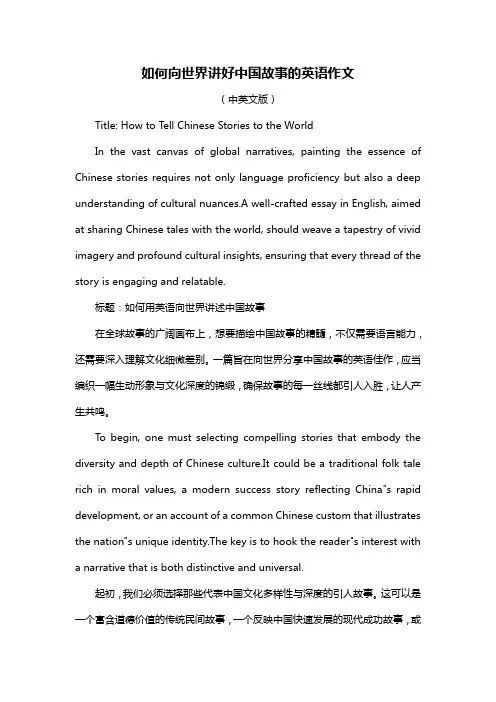
如何向世界讲好中国故事的英语作文(中英文版)Title: How to Tell Chinese Stories to the WorldIn the vast canvas of global narratives, painting the essence of Chinese stories requires not only language proficiency but also a deep understanding of cultural nuances.A well-crafted essay in English, aimed at sharing Chinese tales with the world, should weave a tapestry of vivid imagery and profound cultural insights, ensuring that every thread of the story is engaging and relatable.标题:如何用英语向世界讲述中国故事在全球故事的广阔画布上,想要描绘中国故事的精髓,不仅需要语言能力,还需要深入理解文化细微差别。
一篇旨在向世界分享中国故事的英语佳作,应当编织一幅生动形象与文化深度的锦缎,确保故事的每一丝线都引人入胜,让人产生共鸣。
To begin, one must selecting compelling stories that embody the diversity and depth of Chinese culture.It could be a traditional folk tale rich in moral values, a modern success story reflecting China"s rapid development, or an account of a common Chinese custom that illustrates the nation"s unique identity.The key is to hook the reader"s interest with a narrative that is both distinctive and universal.起初,我们必须选择那些代表中国文化多样性与深度的引人故事。
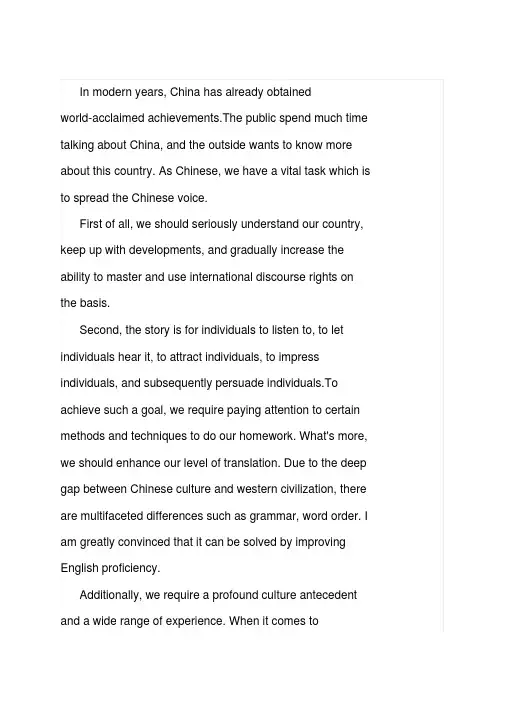
In modern years, China has already obtainedworld-acclaimed achievements.The public spend much time talking about China, and the outside wants to know more about this country. As Chinese, we have a vital task which is to spread the Chinese voice.First of all, we should seriously understand our country, keep up with developments, and gradually increase the ability to master and use international discourse rights on the basis.Second, the story is for individuals to listen to, to let individuals hear it, to attract individuals, to impress individuals, and subsequently persuade individuals.To achieve such a goal, we require paying attention to certain methods and techniques to do our homework. What's more, we should enhance our level of translation. Due to the deep gap between Chinese culture and western civilization, there are multifaceted differences such as grammar, word order. I am greatly convinced that it can be solved by improving English proficiency.Additionally, we require a profound culture antecedent and a wide range of experience. When it comes tounderstand the background of the language, we should bridge between the two different countries. In comparison with these approaches and techniques, belief and obligation are the most important to tell the story well.Last but not least, as our country increasingly approaches the center of the world stage, it will continue to make new achievements and continue to win a better understanding and trust from the international community, laying a good foundation for establishing a community of humankind destiny.赠送以下资料考试知识点技巧大全一、考试中途应饮葡萄糖水大脑是记忆的场所,脑中有数亿个神经细胞在不停地进行着繁重的活动,大脑细胞活动需要大量能量。
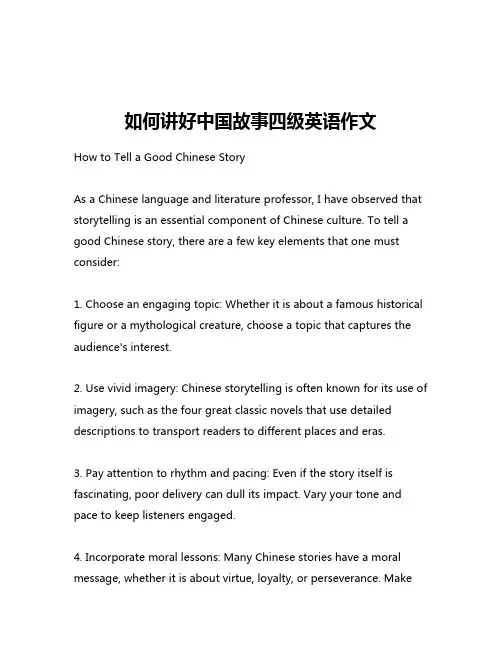
如何讲好中国故事四级英语作文How to Tell a Good Chinese StoryAs a Chinese language and literature professor, I have observed that storytelling is an essential component of Chinese culture. To tell a good Chinese story, there are a few key elements that one must consider:1. Choose an engaging topic: Whether it is about a famous historical figure or a mythological creature, choose a topic that captures the audience's interest.2. Use vivid imagery: Chinese storytelling is often known for its use of imagery, such as the four great classic novels that use detailed descriptions to transport readers to different places and eras.3. Pay attention to rhythm and pacing: Even if the story itself is fascinating, poor delivery can dull its impact. Vary your tone and pace to keep listeners engaged.4. Incorporate moral lessons: Many Chinese stories have a moral message, whether it is about virtue, loyalty, or perseverance. Makesure to emphasize these lessons to your audience.5. Adapt to your audience: Depending on your audience’s language skills, cultural knowledge, and age, you may need to adjust your storytelling style. Keep it simple for younger audiences or those less familiar with Chinese culture.By following these guidelines, you can learn how to tell a good Chinese story and share the rich culture and history of China with others.。
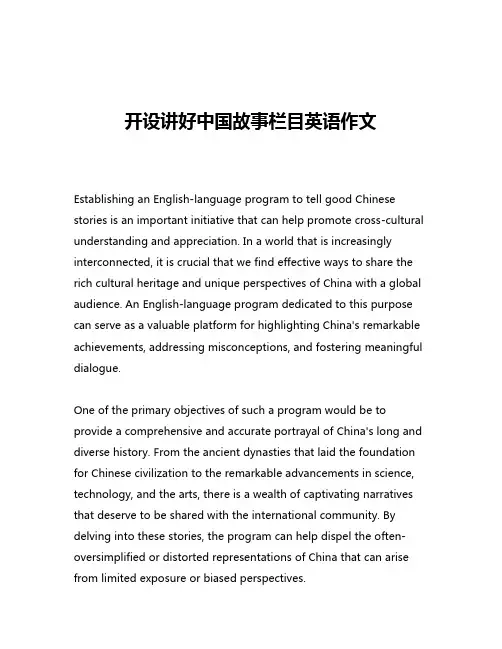
开设讲好中国故事栏目英语作文Establishing an English-language program to tell good Chinese stories is an important initiative that can help promote cross-cultural understanding and appreciation. In a world that is increasingly interconnected, it is crucial that we find effective ways to share the rich cultural heritage and unique perspectives of China with a global audience. An English-language program dedicated to this purpose can serve as a valuable platform for highlighting China's remarkable achievements, addressing misconceptions, and fostering meaningful dialogue.One of the primary objectives of such a program would be to provide a comprehensive and accurate portrayal of China's long and diverse history. From the ancient dynasties that laid the foundation for Chinese civilization to the remarkable advancements in science, technology, and the arts, there is a wealth of captivating narratives that deserve to be shared with the international community. By delving into these stories, the program can help dispel the often-oversimplified or distorted representations of China that can arise from limited exposure or biased perspectives.Furthermore, the program can serve as a platform for showcasing China's vibrant and evolving contemporary culture. In a rapidly changing world, it is essential to present a nuanced understanding of the country's social, economic, and political landscapes. This can involve highlighting the remarkable strides made in areas such as sustainable development, technological innovation, and cultural preservation, as well as addressing the complexities and challenges faced by a nation undergoing significant transformation.One of the key strengths of an English-language program dedicated to telling good Chinese stories is its ability to reach a global audience. By utilizing various multimedia formats, such as documentaries, feature articles, and interactive digital content, the program can effectively disseminate information and engage with viewers and readers around the world. This global reach can foster a greater appreciation for China's rich heritage and contemporary achievements, ultimately contributing to a more informed and balanced understanding of the country.Moreover, the program can serve as a bridge for cross-cultural exchange and mutual understanding. By inviting international perspectives and facilitating dialogues, the program can create opportunities for meaningful interactions and the exchange of ideas. This can help address misconceptions, challenge stereotypes, andpromote a more nuanced and inclusive understanding of China's role in the global community.In order to ensure the success and impact of such a program, it is crucial to assemble a team of knowledgeable and experienced professionals who can effectively communicate China's stories to a diverse international audience. This may include scholars, journalists, filmmakers, and cultural ambassadors who can bring their expertise and unique insights to the table. Additionally, the program should strive to maintain a high level of journalistic integrity, presenting information in a balanced and objective manner, while still capturing the vibrancy and complexity of China's multifaceted culture.Another important aspect of the program's success would be its ability to adapt and evolve with the changing needs and interests of its global audience. This may involve incorporating emerging technologies, exploring new narrative formats, and continuously seeking feedback and input from viewers and readers. By remaining responsive and innovative, the program can maintain its relevance and continue to captivate and inform its audience.In conclusion, the establishment of an English-language program dedicated to telling good Chinese stories is a vital initiative that can contribute to a deeper understanding and appreciation of China's rich cultural heritage and contemporary developments. By providinga comprehensive and nuanced portrayal of the country, the program can help bridge cultural divides, challenge misconceptions, and foster meaningful dialogue on a global scale. As the world becomes increasingly interconnected, the importance of such initiatives cannot be overstated, and they have the potential to play a crucial role in shaping a more informed and inclusive global community.。
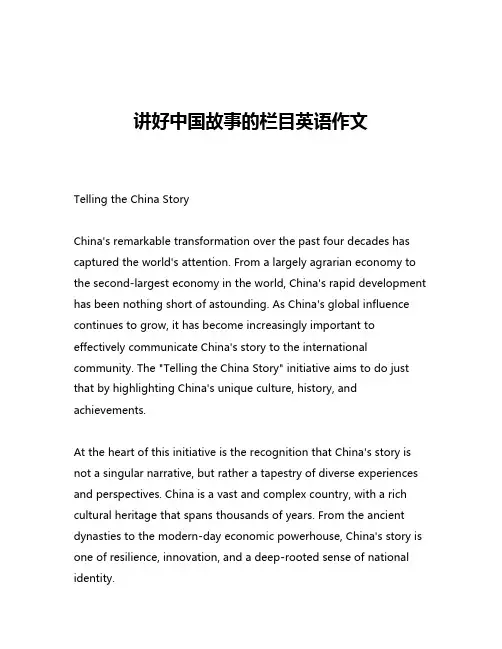
讲好中国故事的栏目英语作文Telling the China StoryChina's remarkable transformation over the past four decades has captured the world's attention. From a largely agrarian economy to the second-largest economy in the world, China's rapid development has been nothing short of astounding. As China's global influence continues to grow, it has become increasingly important to effectively communicate China's story to the international community. The "Telling the China Story" initiative aims to do just that by highlighting China's unique culture, history, and achievements.At the heart of this initiative is the recognition that China's story is not a singular narrative, but rather a tapestry of diverse experiences and perspectives. China is a vast and complex country, with a rich cultural heritage that spans thousands of years. From the ancient dynasties to the modern-day economic powerhouse, China's story is one of resilience, innovation, and a deep-rooted sense of national identity.One of the key objectives of "Telling the China Story" is to challenge the often-simplistic or biased portrayals of China in Western media. Too often, China's story is reduced to a binary of either a rising superpower or a repressive authoritarian state. While these aspects of China's story are certainly important, they fail to capture the full breadth and depth of the country's experiences.Through this initiative, China seeks to present a more nuanced and well-rounded understanding of its development. This includes showcasing the country's technological advancements, its commitment to sustainable development, and its efforts to alleviate poverty and improve the lives of its citizens. It also involves highlighting the unique cultural traditions and artistic achievements that have long been a source of pride for the Chinese people.One of the key ways in which "Telling the China Story" is being carried out is through the promotion of cultural exchange and mutual understanding. This involves initiatives such as the Confucius Institutes, which aim to promote the study of the Chinese language and culture around the world. It also includes the hosting of cultural events and exhibitions that showcase the diversity and richness of China's heritage.Another important aspect of "Telling the China Story" is theemphasis on digital storytelling. In an increasingly interconnected world, the ability to effectively communicate China's story through digital platforms has become crucial. This includes the use of social media, video content, and other digital tools to reach a global audience and share China's narrative in a more engaging and accessible way.Ultimately, the "Telling the China Story" initiative is not just about promoting a specific version of events, but rather about fostering a more nuanced and informed understanding of China's place in the world. By highlighting the country's unique cultural, historical, and economic contributions, this initiative aims to challenge the often-simplistic narratives that have dominated the discourse around China in recent years.At the same time, "Telling the China Story" is not just about China itself, but about the broader global context in which it operates. As China's influence continues to grow, it is increasingly important for the international community to understand the country's motivations, its challenges, and its aspirations. By effectively communicating China's story, this initiative can help to build bridges of understanding and cooperation between China and the rest of the world.In conclusion, the "Telling the China Story" initiative is a vital andtimely effort to present a more comprehensive and balanced understanding of China's past, present, and future. By highlighting the country's unique cultural heritage, its remarkable economic achievements, and its growing global influence, this initiative can help to foster a deeper appreciation for the complexities and nuances that define the China story. As the world continues to grapple with the challenges of the 21st century, the ability to effectively communicate China's narrative will become increasingly important in shaping the global discourse and promoting greater mutual understanding.。

讲好中国故事栏目英语作文Telling the China StoryChina is a country with a rich and fascinating history that spans thousands of years. From the ancient dynasties that laid the foundations of Chinese civilization to the dramatic transformations of the modern era, there are countless stories to be told about this dynamic and influential nation. As China continues to play an increasingly prominent role on the global stage, it is more important than ever to effectively communicate China's narrative to international audiences.The "Telling the China Story" initiative aims to do just that. This program seeks to showcase the multifaceted nature of contemporary China, moving beyond the often one-dimensional portrayals that dominate Western media coverage. By highlighting the country's cultural heritage, technological innovations, environmental stewardship, and people-centered development, the goal is to provide a more nuanced and balanced understanding of China's trajectory.One of the key elements of this initiative is amplifying the voices of ordinary Chinese citizens. Far too often, the Chinese story is told exclusively through the lens of government officials and political elites. While their perspectives are certainly valuable, it is equally important to hear from the farmers, entrepreneurs, artists, and everyday people who are shaping the country's future. Their personal anecdotes and lived experiences can offer a window into the realities of life in modern China, dispelling stereotypes and fostering a greater sense of empathy and connection.Take, for example, the story of Li Jianhua, a small-scale tea farmer in Zhejiang province. For generations, Li's family has cultivated high-quality oolong tea, using traditional methods that have been passed down through the centuries. Despite the encroachment of industrial agriculture and the lure of more lucrative crops, Li has remained steadfast in his commitment to sustainable, artisanal tea production. Through his hard work and dedication, he has not only preserved a vital part of China's cultural heritage but also built a thriving business that supports his local community.Stories like Li's highlight the remarkable resilience and adaptability of the Chinese people. Far from being passive victims of top-down policies, ordinary citizens are actively shaping the trajectory of their country, drawing on deep-rooted values and traditions to navigatethe challenges of modernization. By amplifying these grassroots narratives, the "Telling the China Story" initiative can help to counter the reductive and often sensationalized portrayals that have dominated international discourse.At the same time, the program also seeks to showcase China's remarkable technological advancements and innovative spirit. From the development of cutting-edge renewable energy solutions to the rapid expansion of high-speed rail and 5G networks, China has emerged as a global leader in numerous fields. By highlighting these achievements, the initiative can help to dispel the misconception that China is simply a low-cost manufacturing hub, and instead present the country as a dynamic, knowledge-based economy that is driving progress on a global scale.One particularly compelling example is the story of Huang Weiwei, a young engineer who has been at the forefront of China's efforts to develop next-generation solar technology. Driven by a deep concern for the environment and a passion for innovation, Huang has helped to spearhead the development of highly efficient, cost-effective solar panels that are revolutionizing the renewable energy sector. Through her work, she is not only contributing to China's ambitious climate goals but also inspiring a new generation of scientists and engineers to tackle the pressing challenges of our time.Of course, China's development has not been without its challenges and setbacks. The country has grappled with issues such as income inequality, environmental degradation, and the lingering effects of the COVID-19 pandemic. By acknowledging these challenges and showcasing the efforts of the Chinese government and civil society to address them, the "Telling the China Story" initiative can help to build a more nuanced and balanced understanding of the country's trajectory.For example, the program could highlight the work of urban planners and policymakers who are working to create more livable and sustainable cities, or the grassroots environmental activists who are leading the charge to protect China's natural resources. By shining a light on these efforts, the initiative can demonstrate that China is not simply a monolithic entity but rather a complex, multifaceted society that is grappling with many of the same issues and challenges faced by other countries around the world.Ultimately, the "Telling the China Story" initiative is not about whitewashing or glossing over the realities of contemporary China. Rather, it is about providing a more comprehensive and nuanced understanding of the country, one that recognizes its remarkable achievements and dynamism while also acknowledging its challenges and shortcomings. By amplifying the voices of ordinary Chinese citizens, showcasing the country's technological and innovativeprowess, and addressing its developmental challenges, the program can help to foster a deeper and more informed appreciation of China's role in the world.In an era of increasing geopolitical tensions and growing mistrust between China and the West, the need for effective cross-cultural communication and mutual understanding has never been more urgent. The "Telling the China Story" initiative represents a vital step in this direction, offering a platform for China to share its narrative with the world and to engage in a constructive and meaningful dialogue with international partners. By embracing this opportunity, China can not only enhance its global influence but also contribute to the creation of a more just, sustainable, and interconnected world.。
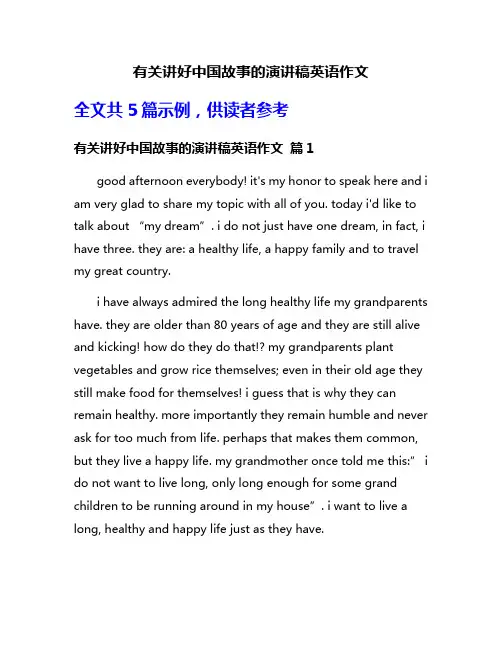
有关讲好中国故事的演讲稿英语作文全文共5篇示例,供读者参考有关讲好中国故事的演讲稿英语作文篇1good afternoon everybody! it's my honor to speak here and i am very glad to share my topic with all of you. today i'd like to talk about “my dream”. i do not just have one dream, in fact, i have three. they are: a healthy life, a happy family and to travel my great country.i have always admired the long healthy life my grandparents have. they are older than 80 years of age and they are still alive and kicking! how do they do that!? my grandparents plant vegetables and grow rice themselves; even in their old age they still make food for themselves! i guess that is why they can remain healthy. more importantly they remain humble and never ask for too much from life. perhaps that makes them common, but they live a happy life. my grandmother once told m e this:” i do not want to live long, only long enough for some grand children to be running around in my house”. i want to live a long, healthy and happy life just as they have.since my graduation from primary school, until now, every time on my birthday i make the same wish. i wish my parents will not fight anymore. i am not complaining that they gave me a bad childhood, they just fight so much! i am unhappy but that does not mean they do not love me. they do! they love me with all their heart. i love my parents also; i want them to live a happy life as well.i want to travel this great country of ours. i want to see the beauty of our country. i want to see the miracles that made this country great! i want to go from the east to west, from the north all the way down to the south! i have a dream, that one day i can travel and see my country with my family and friends! if that is not possible, seeing my country on my own is good enough also.if i can fulfill all three of my dreams in life, then god can take me away. i would be happy, and l would have lived a full and prosperous life.thank you everyone for listening to my dreams.i thank you!有关讲好中国故事的演讲稿英语作文篇2good afternoon, everyone! the topic of my speech today is “being a good listener”.good listening can always showrespect, promote understanding, and improve interpersonal relationship. many people suggest that parents should listen more to their children, so they will understand them better, and find it easy to narrow the generation gap; teachers should listen more to their students, then they can meet their needs better, and place themselves in a good relationship with their students; students should listen more to their classmates, thus they will help and learn from each other, and a friendship is likely to be formed. what i want to stress is that each of us should listen more to others. show your respect and never stop others till they finish their talk; show you are interested by a supportive silence or a knowing smile; be open-minded to different opinions even though you don’t like the in a word, good listening can really enable us to get closer to each other. thank you for your listening!大家下午好! 今天,我演讲的题目是“做一个好的倾听者”。
讲好中国故事介绍设想英语作文Title: The Narrative of China's Stories: A Vision for IntroductionIn the tapestry of global narratives, China's stories stand out as vibrant threads, rich in history, culture, and contemporary achievements. It is imperative to craft and disseminate these narratives effectively, not only to enhance international understanding but also to contribute to the global cultural dialogue. This essay outlines a vision for introducing China's stories in a manner that is both authentic and engaging.First and foremost, it is essential to identify the core elements of China's stories. These include its ancient civilization, with its profound philosophical systems and literary treasures; its diverse ethnic cultures, each with their unique customs and traditions; and its remarkable journey of modernization, from a centuries-old agrarian society to a global economic powerhouse. Each of these elements is a rich mine of narratives, waiting to be unearthed and shared with the world.In presenting these stories, authenticity is paramount. It is crucial to avoid stereotypes and misrepresentations that often accompany cross-cultural communication. Instead, we should strive to present a multifaceted and nuanced picture of China, one that captures its complexity and dynamism. This requires a deep understanding of China's history, culture, and society, as well as a sensitivity to international audiences and their cultural backgrounds.Moreover, the narratives should be crafted in a waythat is engaging and relatable. Storytelling is an art, and the best stories are those that resonate with listeners on an emotional level. Whether it's the tale of a heroicfigure from ancient times, the story of a modern-day innovator, or the account of a community's struggle and success, the narratives should evoke a sense of wonder, admiration, or empathy in the listener.In terms of dissemination, a multi-channel approach is advisable. Traditional media such as books, newspapers, and documentaries can play a crucial role in introducingChina's stories to a wider audience. However, it is also important to leverage digital platforms and social media,which have the potential to reach a vast and diverse audience. Blogs, podcasts, videos, and interactive online experiences can all be effective tools for storytelling.Furthermore, it is important to involve diverse voicesin the creation and dissemination of these narratives. This includes not only Chinese citizens but also foreigners who have lived in China and have a deep understanding of its culture and society. Their perspectives can provide aunique and valuable insight into China's stories, making them more accessible and appealing to international audiences.Finally, it is worth noting that introducing China's stories is not a one-time event but a continuous process.As China continues to evolve and develop, new stories will emerge, reflecting its changing landscape and society. It is, therefore, essential to stay updated, adapt to new trends, and continuously refine our narratives to ensurethat they remain relevant and resonate with the times.In conclusion, introducing China's stories is a challenging but rewarding task. By focusing on authenticity, engagement, and diversity, we can craft narratives that notonly showcase China's rich cultural heritage and achievements but also foster mutual understanding and respect between cultures. This, in turn, can contribute to a more harmonious and inclusive global community.。
高考英语作文用英语讲好中国故事Telling China's Stories WellChina, with its rich history and diverse culture, has many fascinating stories that are worth sharing with the world. Telling China's stories well in English can help people from other countries understand and appreciate Chinese culture, traditions, and achievements. Here’s how we can effectively share these stories.Firstly, it is important to highlight the unique aspects of Chinese culture. China is known for its ancient civilization, with traditions that date back thousands of years. Stories about famous historical figures, such as Confucius or the Great Wall of China, can captivate audiences. By explaining the significance of these elements and their impact on Chinese culture, we help others gain a deeper appreciation for China's heritage.Secondly, using engaging and relatable language is crucial. When translating Chinese stories into English, it’s essential to choose words and phrases that resonate with an internationalaudience. This means avoiding overly complex terms and providing clear explanations for cultural references. For example, when describing traditional Chinese festivals like the Spring Festival, it’s helpful to explain customs such as family reunions and the importance of the lunar calendar.Additionally, incorporating modern elements can make the stories more appealing. Many aspects of contemporary Chinese life, such as technological innovations or popular entertainment, are also interesting to international audiences. Stories about China's advancements in technology or the global success of Chinese films and music can highlight the country’s progress and creativity.Visual aids, such as photos or videos, can enhance storytelling. Images of Chinese landmarks, traditional clothing, and cultural events can help illustrate the narrative and make it more engaging. Multimedia presentations can bring stories to life and provide a richer understanding of Chinese culture.Lastly, sharing personal experiences and perspectives can make the stories more authentic. Personal anecdotes about visitingChina, learning Chinese traditions, or interacting with locals can offer a unique and relatable viewpoint. This personal touch can make the stories more memorable and impactful.In conclusion, telling China’s stories well in English involves highlighting unique cultural aspects, using relatable language, incorporating modern elements, utilizing visual aids, and sharing personal experiences. By doing so, we can bridge cultural gaps and foster greater understanding and appreciation between China and the world.。
用英语讲好中国故事英语作文范文Telling Chinese stories in English is a great way to introduce the rich history and culture of China to a global audience. By sharing these stories, we can bridge the gap between different cultures and foster understanding and appreciation for Chinese traditions. In this essay, I will discuss the importance of telling Chinese stories in English and provide some tips on how to effectively do so.First and foremost, telling Chinese stories in English allows people from all around the world to learn about the fascinating culture and history of China. From ancient myths and legends to modern-day achievements, Chinese stories offer a unique insight into the values and beliefs of the Chinese people. By sharing these stories in English, we can create greater awareness and appreciation for Chinese culture on a global scale.Furthermore, telling Chinese stories in English helps to promote cross-cultural understanding and communication. Language barriers can often prevent people from different cultures from fully understanding and connecting with each other. By translating Chinese stories into English, we can break down these barriers and promote dialogue and exchange between people from different backgrounds.When telling Chinese stories in English, it is important to consider the cultural context and nuances of the stories. Some Chinese concepts and traditions may not have direct equivalents in English, so it is important to provide explanations and context to ensure that the stories are accurately understood. Additionally, it is important to maintain the integrity and authenticity of the stories while translating them into English.One effective way to tell Chinese stories in English is through storytelling and oral traditions. By sharing these stories orally, we can engage audiences and bring the stories to life in a way that written texts may not be able to. Additionally, storytelling allows for a more interactive and immersive experience, allowing audiences to connect with the stories on a deeper level.In conclusion, telling Chinese stories in English is a powerful way to promote cultural understanding and appreciation. By sharing these stories, we can showcase the rich history and traditions of China to a global audience and foster greater cross-cultural communication. Whether through oral storytelling or written translations, telling Chinese stories in English is an important step towards building bridges between different cultures and promoting mutual respect and understanding.。
学习英语,讲中国故事英语作文Learning English to Tell Chinese StoriesIn today's interconnected world, the ability to communicate effectively across cultures has become increasingly important. As a Chinese citizen, I believe that learning English opens up a global platform for us to share our unique stories and perspectives with the wider world.English, as a global language, bridges cultural divides and allows us to connect with people from diverse backgrounds. By mastering this language, we gain the opportunity to present the rich history, culture, and traditions of China to an international audience.I have personally embarked on this journey of learning English not just to enhance my career prospects or to travel more easily, but also to become a cultural ambassador for China. I aspire to use my language skills to introduce the beauty and depth of Chinese culture, history, and modern achievements to a wider audience.Through English, I can retell the legends of the Yellow Emperor or the Eight Immortals, share the philosophical wisdom of Confucius or Lao Tzu, and explain the significanceof traditional festivals like the Spring Festival or theMid-Autumn Festival. Moreover, I can discuss China's remarkable progress in science, technology, and economy, showcasing how our country has transformed over the years.Learning English also allows us to engage in meaningful dialogue with people from other cultures, fostering mutual understanding and respect. By sharing our stories, we can dispel myths and stereotypes, promoting a more accurate and nuanced understanding of China and its people.In conclusion, learning English is not just about mastering a new language; it is about opening a window to the world, sharing our rich cultural heritage, and building bridges of understanding between China and the rest of the globe. As we embrace this opportunity, we can contribute to a more inclusive and understanding world.。
如何讲好中国故事英语作文小学Telling Chinese Stories Well in English for Primary School ChildrenTelling Chinese stories to primary school children in English is an exciting way to introduce them to both Chinese culture and the beauty of the English language. Here are some tips to help you do it well:Choose Appropriate Stories: Select stories that are interesting, easy to understand, and culturally significant. Tales of heroes, legends, or folktales often work best as they are both engaging and educational.Simplify the Language: Use simple vocabulary and short, easy-to-follow sentences. Avoid complex grammatical structures or uncommon words. If possible, use illustrations or pictures to help explain the story.Make It Interactive: Involve the children in the storytelling process. Ask them questions, let them predict what will happen next, or have them role-play characters. This makes the story more engaging and memorable.Teach Cultural Elements: Point out any cultural aspects in the story, such as traditions, festivals, or values. Explain whatthey mean and how they are important in Chinese culture. This helps the children understand the story in a deeper context.Encourage Creativity: Encourage the children to use their imagination when listening to the story. Ask them to draw pictures, write their own endings, or create their own stories based on the theme. This fosters creativity and critical thinking.Have Fun: Remember to make the storytelling session fun and enjoyable for the children. Use your voice, facial expressions, and gestures to bring the story to life. This makes the experience more engaging and memorable for the children.By following these tips, you can effectively tell Chinese stories to primary school children in English, introducing them to a rich cultural heritage while also enhancing their language skills.。
如何讲好中国故事英语作文小学英文Version: Telling Chinese Stories WellTelling Chinese stories well is an important way to share China's rich culture and history with the world. Here are some tips on how to do it effectively:Know Your AudienceUnderstanding who you are speaking to is crucial. Tailor your story to the age, interests, and background of your audience. For example, if you are talking to children, you might choose a folk tale or a simple story that captures their imagination.Choose the Right StorySelect a story that resonates with your audience and highlights aspects of Chinese culture. You might pick a traditional legend, a modern tale, or a personal anecdote that reflects Chinese values and traditions.Use Vivid LanguageEngage your listeners by using descriptive language. Paint a picture with words, describing the setting, characters, and emotions. This helps bring the story to life and makes it more memorable.Include Interactive ElementsFor younger audiences, consider adding interactive elements like questions, props, or even songs. This keeps children engaged and helps them connect with the story on a deeper level.Explain Cultural ReferencesMake sure to explain any cultural references or customs that might be unfamiliar to your audience. This not only educates them but also enriches their understanding of the story.Practice Your DeliveryPractice telling the story aloud. Pay attention to your tone, pace, and expression. Good storytelling involves not just the words but also how they are delivered.Encourage QuestionsAfter telling the story, invite your audience to ask questions. This opens up adialogue and allows you to clarify any points or delve deeper into the story's themes.By following these tips, you can effectively share Chinese stories with others, helping to bridge cultures and promote understanding.中文Version: 讲好中国故事讲好中国故事是向世界分享中国丰富多彩的文化和历史的重要方式。
英语作文-如何用英语讲好中国故事
In modern years, China has already obtained world-acclaimed achievements.The public spend much time talking about China, and the outside wants to know more about this country. As Chinese, we have a vital task which is to spread the Chinese voice.
First of all, we should seriously understand our country, keep up with developments, and gradually increase the ability to master and use international discourse rights on the basis.
Second, the story is for individuals to listen to, to let individuals hear it, to attract individuals, to impress individuals, and subsequently persuade individuals.To achieve such a goal, we require paying attention to certain methods and techniques to do our homework. What's more, we should enhance our level of translation. Due to the deep gap between Chinese culture and western civilization, there are multifaceted differences such as grammar, word order. I am greatly convinced that it can be solved by improving English proficiency.
Additionally, we require a profound culture antecedent and a wide range of experience. When it comes to
understand the background of the language, we should bridge between the two different countries. In comparison with these approaches and techniques, belief and obligation are the most important to tell the story well.
Last but not least, as our country increasingly approaches the center of the world stage, it will continue to make new achievements and continue to win a better understanding and trust from the international community, laying a good foundation for establishing a community of humankind destiny.。